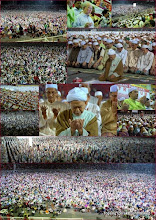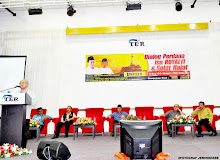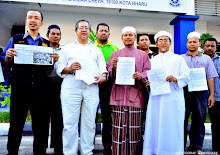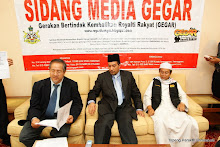KUALA TERENGGANU, March 19: PAS leaders in Terengganu welcomed the offer from Umno veteran Tengku Razaleigh Hamzah to act as middleman for the state in seeking the return of oil royalty payments long-owed to it by the federal government.
“There can be no other person more qualified than Tengku Razaleigh when it comes to the agreements signed between the states and Petronas," PAS MP for Kuala Terengganu Wahid Endut told Harakahdaily.
“Ku Li was the signatory for Petronas acting in his capacity as chairman. In all these agreements, it was stipulated that Petronas would pay 5 percent of total oil produced annually. And these were standard agreements, not individualized." According to Wahid, who has copies of all the agreements, Petronas signed up with Terengganu on March 22, 1975, with Kelantan on May 9, 1975, with Sabah on March 27, 1975 and with Sarawak on June 14, 1976.
“In fact, all the 13 states and the federal government signed contracts with Petronas. Even the federal government was granted 5 percent for oil production in its territory. But Brunei wanted more, so that’s why it didn’t join,” said Wahid.
Legal action may not bear fruit
Oil royalty payment or rather non-payment has long been a source of discontent to the people not just in Terengganu, but also in neighbouring Kelantan, with the federal government refusing to honor the Petronas contracts.
As a result, the two east coastal states have remained among the poorest in the country despite their enormous oil wealth.
Petronas, the national oil firm, falls directly under the jurisdiction of the prime minister. But like his predecessors, Prime Minister Najib Razak has refused to acknowledge the contracts.
He has argued that Kelantan and Terengganu were only entitled to whatever wang ehsan (goodwill or compassionate money) the federal government deemed was appropriate.
“This is why Tengku Razaleigh has advised against taking the case to the courts. Look at the Perak crisis, see how Najib and the federal government have twisted and bent the law. It is no wonder that no one trusts them anymore,” Wahid said.
“Terengganu under PAS president Hadi Awang filed a lawsuit 10 years ago but somehow the judiciary has managed to keep delaying the case until now. Kelantan has just started. They also want to sue the federal government. But it is a long journey and we must take other action in the meantime.”
Terengganu as well
Indeed there have been intensifying movements by the people in both states to reclaim their oil rights. Crowds have packed nightly ceramahs (political lectures) held by PAS and PKR and a series of peaceful gatherings have been planned to deliver a memorandum to the King, beseeching him to intervene.
At a seminar in Kuala Terengganu organized by pressure group Gegar, Tengku Razaleigh received a standing ovation from a packed auditorium on Thursday night when he offered to act as middleman for Terengganu. He had volunteered to mediate for Kelantan in January.
The Kelantan prince has championed his home state's right to oil royalty, although it is in direct contradiction to his party's official stance. Razaleigh was the founding chairman of Petronas and the Finance Minister who drew up the Petroleum Development Act 1974 for the federal government.
“I can be the middleman between the state government, any state government not just Kelantan, and the federal government to solve the matter. For free,” Razaleigh said.
“If the people are afraid that the money will be abused for politics or anything else, I am willing to be the middleman to ensure the benefit is for the people.
Corruption and abuse
According to Razaleigh, federal agencies in Terengganu have spent RM20 billion of the state’s oil revenue.
However, there has been no proper accounting of how much money has come in and from where, and how much money has gone out and to where. On record, only RM1.6 billion of wang ehsan was approved in the last five years, he said.
“It seems that the current Terengganu government cannot accept the accounts of how the money was spent five years ago because there were lots of abuses,” said Razaleigh.
“Build this, build that. Everything collapses, nothing remains standing. With a lot of money comes corruption, a lot of things are priced higher to steal the money and this is what is called goodwill payments.” Harakahdaily
|






No comments:
Post a Comment